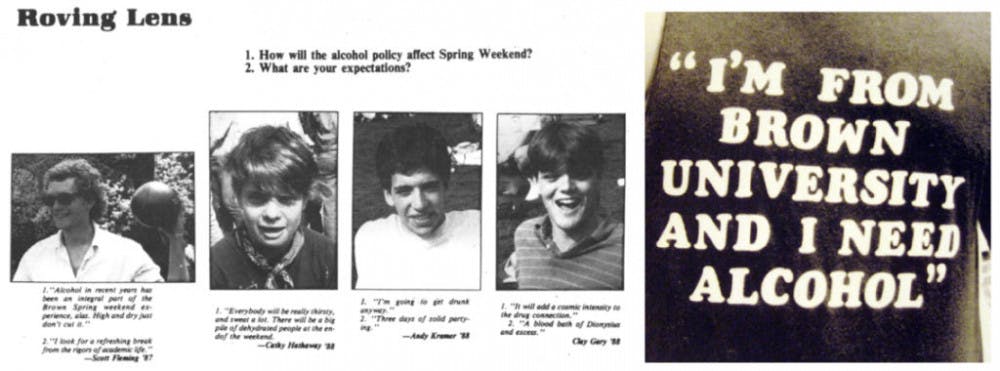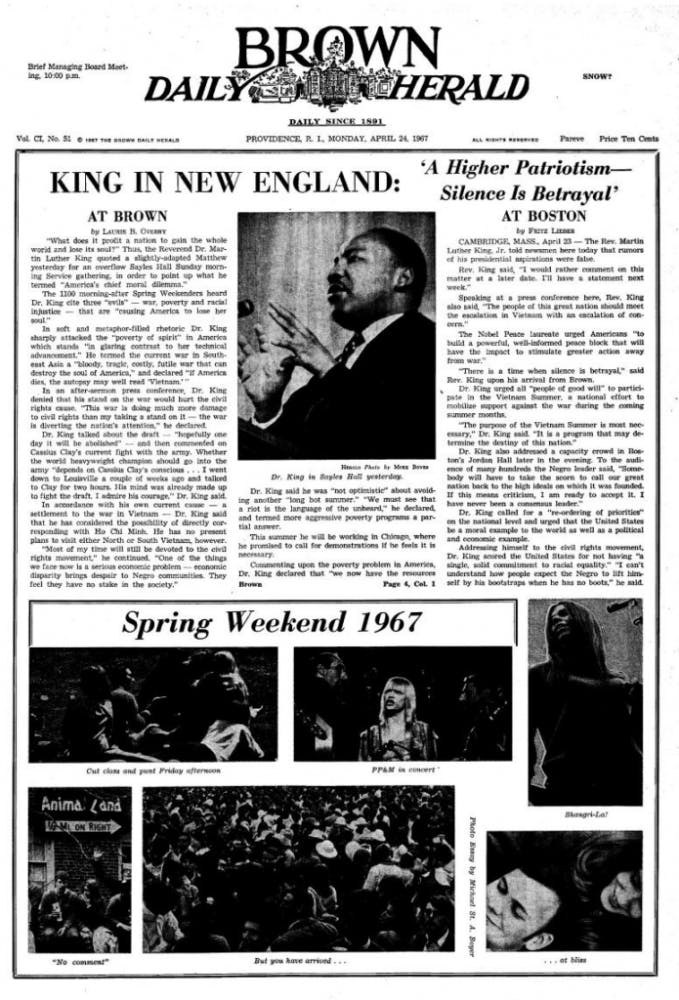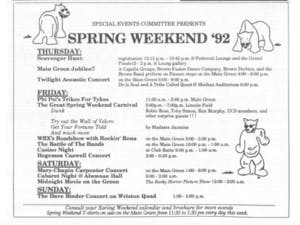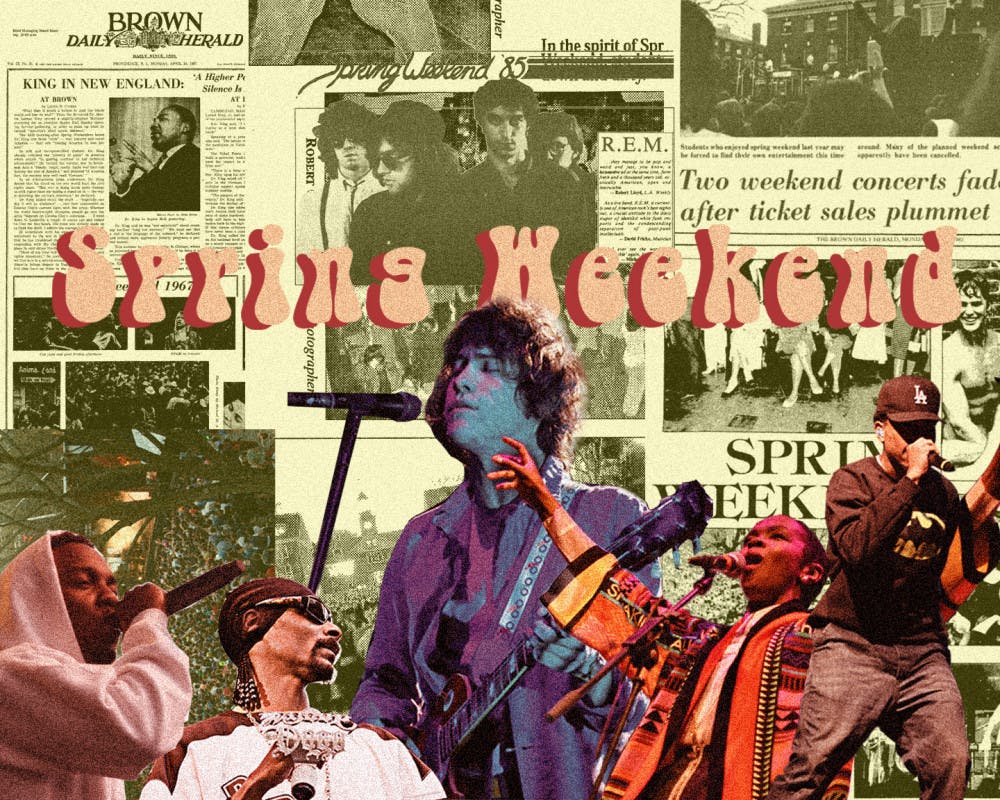For the first time since Brown’s annual music festival was born in 1950, Brown Concert Agency’s highly anticipated Spring Weekend was canceled completely in response to the COVID-19 pandemic, leaving students wondering what their experience might have been.
This year's Spring Weekend, which was to take place over April 24 and 25, would have marked the 70th anniversary of the community tradition. But even though Spring Weekend was officially founded in 1950, its history extends even further back into Brown’s past. Annual spring gatherings of students and musical performances date back to 1898, The Herald previously reported.
And, for all of the years that it has run, Spring Weekend has been a canonical tradition associated with pleasant weather and the quintessential College Hill experience.
Brown Concert Agency, self-described as “a group of Brown students who love music,” is overseen by the Student Activities Office and funded by the Undergraduate Finance Board. The organization is responsible for bringing two days of artists and musical performance to the Main Green each April. Last year, nearly 1,200 students marked “going” on the official Facebook event page, indicative of its perennial popularity among the Brown community.
“Spring Weekend is the favorite part of our year,” said Andy Rickert ’21, a BCA board member. “We started working at the beginning of September; so much planning went into it, and it’s all for naught.”
Although BCA declined to comment on which artists were scheduled to perform, Rickert said that “the allocated budget for Spring Weekend artists this year was ultimately returned to UFB,” and confirmed that “none of the artists actually got paid.”

But 2020’s pandemic — although certainly the most grave — is not the first obstacle to hit Spring Weekend.
In 1973, the Friday and Saturday night concerts were canceled and replaced with a free afternoon concert on the green, after ticket sales plummeted and it became “apparent that the program planned for the weekend was not to the appreciation of the Brown student community,” then-Director of Student Activities William Surprenant ’51 told The Herald at the time. With new concert venues opening in Providence and the “skyrocketing cost of (first-class) talent,” the cancellation sparked discussion about the future of Spring Weekends. John Egelhofer ’74 MD’77, then-chairman of the Concert Agency and member of the group’s Spring Weekend Committee, noted that in the coming years, “Spring Weekend will have to be scaled up or down.”
A far more trivial controversy raided 1985’s Spring Weekend, which adopted the catchphrase “Take Life S/NC.” In the wake of the 1984 passing of the National Minimum Drinking Age Act, which raised Rhode Island’s legal drinking age from 18 to 21, The Herald interviewed students on how the new policy might affect their Spring Weekend plans. To encourage “responsible imbibing” in light of the new legislation, Brown brought off-duty state troopers to campus to perform optional breathalyzer tests, according to Encyclopedia Brunoniana.

Despite these historic obstacles, Spring Weekend has been infallible in its showcase of illustrious headliners — among the plethora of performers are Bob Dylan in 1964, Yo La Tengo in 1998, Snoop Dogg in 2010, Lauryn Hill in 2014 and Aminé in 2019.
In 1998, The Herald interviewed Ira Kaplan, member of critical darling indie rock band Yo La Tengo, which performed at that year’s Spring Weekend. At the time, Yo La Tengo, characterized as a band not “afraid to poke a little fun at rock stardom” in The Herald, had just begun to develop a cult following from critics and fans. Only a year prior, Yo La Tengo had released the eclectic and sonically diverse album “I Can Hear the Heart Beating as One,” which would go on to receive critical acclaim.
Kaplan, a former rock critic, also offered The Herald insight into his views on the state of music journalism in the mid-1990s. To him, one of music journalism’s main faults was “an unfortunate emphasis on music business as opposed to music. I wouldn’t limit that to rock journalism, I’d limit that to entertainment journalism,” Kaplan said.

In 1985, the headliner was a young R.E.M.: the band now ubiquitously known for their distinctly haunting and emotionally resonant sound. “So for newcomers to R.E.M., now’s your chance. R.E.M. and ‘special guests’ will be playing Saturday at 3:00 on Pembroke Field,” The Herald reported in a 1985 interview with the still-rising group in anticipation of their performance. The alternative rock band’s video for the hit melancholic tune “Everybody Hurts” would go on almost a decade later to receive seven nominations for the 1994 MTV Video Music Awards, four of which they won.
A Herald column in the same 1985 edition titled “We’re Watching” playfully encouraged students to attend Spring Weekend: “Mom’s not watching, that paper will get done, finals are a world away, and job offers will come,” wrote The Herald columnist. “Spring Weekend is more than a Twister game. It’s more than R.E.M. Spring Weekend … is a state of mind.”
This Spring Weekend “state of mind” is palpable for many student attendees. Of his memories of past Spring Weekend performances, Spencer Small ’21 reflected that “The memory I will forever associate with Spring Weekend is not one from the middle of a ‘Caroline’ moshpit, as fun as that was.” Rather, he will remember spring on College Hill through “the atmosphere of Whitney’s breezy afternoon set, when a setting sun and a warm guitar together seemed to heighten both the colors and people around me.”
The remembrance of campus life through the vehicle of Spring Weekend is something that extends beyond the Brown experience. In a reflection in “The Brown Reader: 50 Writers Remember College Hill,” Ira Magaziner ’69 — who would go on to be an advisor in the Clinton administration — recalled his experience spearheading Spring Weekend planning while at Brown. “We had James Brown, Dionne Warwick, Procol Harum, the Yardbirds and Dizzy Gillespie; for the poetry crowd we had Allen Ginsberg and Lawrence Ferlinghetti,” he wrote. “To launch the event, we chartered a small airplane to fly over the college green and dump thousands of colored ping pong balls stamped with WELCOME SPRING WEEKEND.”

Spring Weekend has even served as a venue for momentous political movement. During 1967’s Spring Weekend, Dr. Martin Luther King Jr. offered a Sunday morning service gathering in Sayles Hall, The Herald previously reported. “The (11 o’clock) morning-after Spring Weekenders heard Dr. King cite three ‘evils’ — war, poverty and racial injustice — that are ‘causing America to lose her soul.’”
In more recent years, the Sunday after the two official nights of Spring Weekend concerts has brought students together on Wriston or Ruth Simmons quadrangles to hear the folk sounds of artist Dave Binder, who has made an appearance at Spring Weekend nearly every year since 1986. Last year, The Herald reported that Binder’s 2019 performance might be his last — with the Greek Council and UFB revoking administrative support and funding due to concert staffing problems.
For many students, an integral part of the Spring Weekend tradition is the excitement, myth and surprise behind which artists are to come every year.
Before learning of Spring Weekend’s cancellation, students continued to participate in the anticipatory guessing-game tradition. Predictions ranged across genre, and a few hopeful students surmised that rising pop-rap star Doja Cat might perform: “I was really hoping to see Doja Cat, and I was so excited because it seemed like her popularity was rising as the day got closer,” said Alisa Caira ’22. An anonymous Dear Blueno post published on February 20 wrote, “Doja Cat for SW 2020 is achievable,” and the confessional-style Facebook page is populated by numerous similar calls for the Los Angeles rapper’s Spring Weekend attendance.
Each year, Spring Weekend lineup release parties break the surprise of who is to perform — last year’s celebration at the MET revealed the lineup to include Aminé, Yaeji and Daniel Caesar. With preluding performances from student bands — last year’s including Baird and the Backyard Byrds, Sebastian. Otero y La Ponina and Fizzle — BCA traditionally announces the artists at midnight to much celebration.
But, Spring Weekend is not only a venue for the celebration of music. Each April, campus bustles with celebrations related to Spring Weekend. In 1982, these events ranged from Phi Psi’s “Trikes For Tykes” to a Midnight Movie on the Green.

Although the cancellation of the oft sun-soaked spring tradition is not at the fore of students' concerns during this time of social distancing, students still lament the loss of their Spring Weekend. Grace Cangiano ’23 expressed that she was excited to experience her first Spring Weekend at Brown, and that she “was just starting to get close with my class, so it feels like a missed bonding experience.”
Though students will not be together on College Hill to bask in the Spring Weekend spirit, perhaps in the nostalgia for the ghosts of Weekends past, there remains optimism for the future of Brown’s flesh-and-blood musical tradition.





